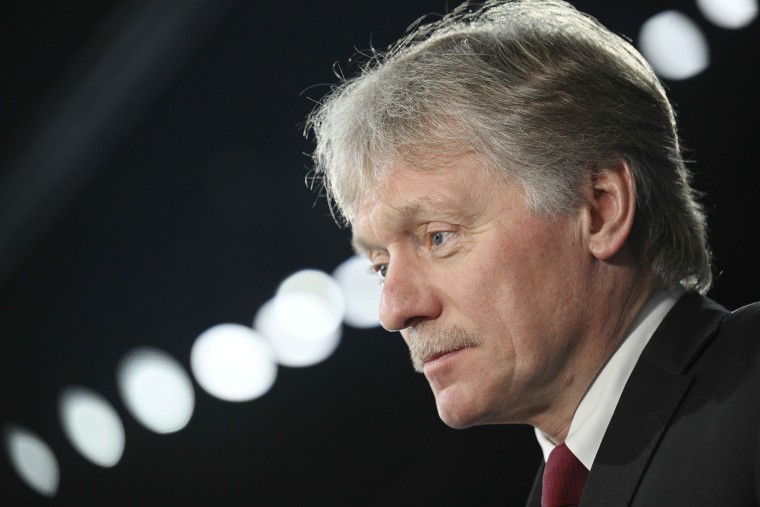MUNICH — Authorities probing the mysterious sabotage of the Nord Stream gas pipelines searched a vessel suspected of carrying explosives used in the blasts, German officials said Wednesday.
A vessel was searched from Jan. 18 to Jan. 20 this year “in connection with a suspicious ship rental,” the German Federal Prosecutor’s office said in a statement.
"There is the suspicion that the ship in question could have been used to transport explosive devices" that were used to blow up the Nord Stream 1 and Nord Stream 2 pipelines in the Baltic Sea last September, the statement added.
The explosions have become a highly sensitive geopolitical issue with potential ramifications for Russia's war in Ukraine, Western support for Kyiv and Europe’s drastic reduction in the amount of Russian energy it consumes. Initial suspicions fell on the Kremlin, but there has been little clarity from the ongoing investigations.
German prosecutors said Wednesday that their "evaluation of the seized traces and objects is ongoing," adding that the German company that rented the searched vessel was not suspected of involvement. "Reliable statements on this, especially on the question of state control, cannot be made at this time," the statement added.
It offered little detail and said the nationality and identity of the perpetrators, who have yet to be arrested or publicly identified, was the subject of ongoing investigation.
The German authorities' announcement comes after multiple news outlets reported that U.S. intelligence suggested a pro-Ukrainian group may have been responsible. Kyiv has denied any involvement.
The Washington Post reported Tuesday that American and European intelligence officials believed pro-Ukrainian saboteurs may be responsible, after the New York Times reported that new intelligence reviewed by U.S. officials suggested the same. German daily newspaper Die Zeit and public broadcasters ARD and SWR reported Tuesday that the boat used in the attack was based in Poland and rented by two Ukrainians.
NBC News has not confirmed the reports. Both the CIA and Office of the Director of National intelligence declined to comment.
Germany's defense minister urged caution Wednesday and suggested the blasts could have been a "false flag" attack to try and smear Ukraine.
“We have to make a clear distinction whether it was a Ukrainian group, whether it may have happened at Ukrainian orders, or a pro-Ukrainian group (acting) without knowledge of the government. But I am warning against jumping to conclusions,” Boris Pistorius said on the sidelines of a summit in Stockholm. He said earlier the likelihood was “equally high” that it could have been a “false flag operation staged to blame Ukraine.”
Ukrainian officials strongly denied any involvement.
Mykhailo Podolyak, an adviser to President Volodymyr Zelenskyy told NBC News that his country was "absolutely not involved in the attacks."
"It does not make any tactical sense, because it does not affect the course of the war at all, does not reduce the resource capabilities of the Russian military, and does not provoke the withdrawal of Russians from the territory of Ukraine," he said.
Ukraine's Defense Minister Oleksii Reznikov called the reports a “little bit strange” and said the sabotage had “nothing to do” with his government.
Speaking at the summit in Stockholm, he said he was not concerned that the reports might weaken support in the West for his country's defensive fight.
“It’s like a compliment for our special forces,” Reznikov said jokingly. “But this is not our activity.”
"Although I like to collect interesting conspiracy theories about the Ukrainian government, I must point out that Ukraine has no connection to the incident in the Baltic Sea and no information about ‘pro-Ukrainian sabotage groups,'" presidential adviser Mikhailo Podolyak said on Twitter Tuesday.
Moscow also rejected the reports, suggesting they were a deliberate effort to distract from the true culprit.
“Clearly, the authors of the terrorist attack want to distract attention,” Kremlin spokesman Dmitry Peskov said Wednesday according to state-run news agency RIA Novosti, suggesting that whoever was behind the attack was taking part in a “coordinated leak” by supplying information to international media.
Peskov also demanded that Russia be allowed to take part in the investigation into the blasts.
“It’s not just weird. It smells like a monstrous crime. At a minimum, the shareholder countries of the Nord Streams and the U.N. should demand an urgent transparent investigation with the participation of everyone who can shed light,” he said.

White House National Security Council spokesman John Kirby declined to comment on the New York Times report Tuesday, noting that probes into the incident by Denmark, Germany, and Sweden remain active.
“We need to let these investigations conclude,” Kirby said. “And only then should we be looking at what follow on actions might or may not be appropriate.”
Explosions at two locations off Sweden and two off the coast of Denmark last September caused huge leaks in the Nord Stream 1 and 2 pipelines, which were made to transport natural gas from Russia to Germany.
Sweden’s Security Service said in November that traces of explosives were found on the seabed, confirming that the pipes’ destruction was “gross sabotage.”
Western countries were quick to accuse Russia of plotting the attack in its aftermath, although no evidence has emerged to confirm this. Moscow has consistently denied all involvement and counter-accused Western powers of secretly ordering it.
The pipelines have long been a target of criticism by the United States and some allies, who warned that they threatened Europe’s energy security by leaving the continent overly dependent on Russian gas.
Germany halted certification of Nord Stream 2 after Russia’s full-scale invasion of Ukraine, and Moscow stopped the flow of gas in Nord Stream 1 weeks before the pipeline blasts.
Carlo Angerer reported from Munich, and Patrick Smith from London.
